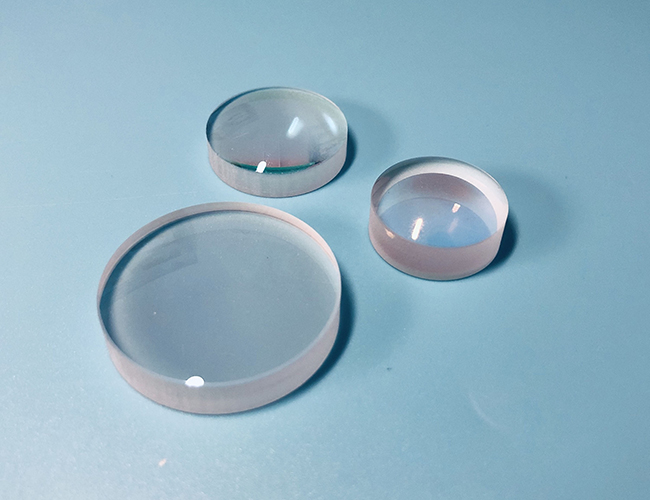ISO9001 Certified Professional Manufacturer & Supplier of Optics
+86-0431-87911611 admin@ytoptics.com
Contact us
-
 Email: admin@ytoptics.com
Email: admin@ytoptics.com
-
 Tel:86-0431-87911611
Tel:86-0431-87911611
-
 Add: 2# Automotive Innovation
Add: 2# Automotive Innovation
Jilin Province, China
Home > Products > Lenses > Infrared Lenses

Infrared BaF2 Lens
Barium fluoride (BaF₂) is an important inorganic optical material widely used in optical systems in the ultraviolet, visible and infrared wavelengths.
Share this:
What are the advantages of barium fluoride?
Wide band transmission: good transmission from UV to IR.
Low absorption: low absorption and high transmittance in UV and IR bands.
Chemical stability: acid and alkali corrosion resistance, suitable for harsh environments.
What are the disadvantages of barium fluoride?
Low hardness: easy to scratch, need protective measures.
Poor thermal stability: high coefficient of thermal expansion, performance degradation at high temperature.
High cost: high material and processing costs.
Applications of barium fluoride lenses
1. Infrared optics: barium fluoride lenses have excellent transmission properties in the infrared band (especially 8-14μm), so they are commonly used as windows in thermal imaging systems.
2. Ultraviolet and visible optics: although the transmittance of barium fluoride in the visible and near-ultraviolet regions is not as good as in the infrared region, it can still be used to manufacture optical elements in a specific wavelength range, such as lenses, prisms and filters.
3. Scintillation detectors: barium fluoride crystals have both fast and slow luminescence components, which makes them important for use in scintillation detectors in the fields of high energy physics, nuclear physics and nuclear medicine.
4. Electronic industry: in the electronic industry, barium fluoride can be used in the preparation of electronic components such as electronic tubes and transistors, utilizing its better conductivity and stability.
5. Glass and ceramics manufacturing: barium fluoride can reduce the refractive index of glass and improve its light transmittance; in ceramics manufacturing, it can increase the hardness of ceramics and improve its heat resistance and insulating properties.
Highly Recommended Infrared Lenses from Yutai Optics:
Optical Infrared Lenses
Infrared Silicon Lens
Infrared ZnSe Lens
Infrared CaF2 Lens
Infrared MgF2 Lens
Infrared LiF Lens
Infrared Germanium Lens
Infrared Standard ZnS Lens
Infrared Multispectral ZnS Lens
Wide band transmission: good transmission from UV to IR.
Low absorption: low absorption and high transmittance in UV and IR bands.
Chemical stability: acid and alkali corrosion resistance, suitable for harsh environments.
What are the disadvantages of barium fluoride?
Low hardness: easy to scratch, need protective measures.
Poor thermal stability: high coefficient of thermal expansion, performance degradation at high temperature.
High cost: high material and processing costs.
Applications of barium fluoride lenses
1. Infrared optics: barium fluoride lenses have excellent transmission properties in the infrared band (especially 8-14μm), so they are commonly used as windows in thermal imaging systems.
2. Ultraviolet and visible optics: although the transmittance of barium fluoride in the visible and near-ultraviolet regions is not as good as in the infrared region, it can still be used to manufacture optical elements in a specific wavelength range, such as lenses, prisms and filters.
3. Scintillation detectors: barium fluoride crystals have both fast and slow luminescence components, which makes them important for use in scintillation detectors in the fields of high energy physics, nuclear physics and nuclear medicine.
4. Electronic industry: in the electronic industry, barium fluoride can be used in the preparation of electronic components such as electronic tubes and transistors, utilizing its better conductivity and stability.
5. Glass and ceramics manufacturing: barium fluoride can reduce the refractive index of glass and improve its light transmittance; in ceramics manufacturing, it can increase the hardness of ceramics and improve its heat resistance and insulating properties.
Highly Recommended Infrared Lenses from Yutai Optics:
Optical Infrared Lenses
Infrared Silicon Lens
Infrared ZnSe Lens
Infrared CaF2 Lens
Infrared MgF2 Lens
Infrared LiF Lens
Infrared Germanium Lens
Infrared Standard ZnS Lens
Infrared Multispectral ZnS Lens

TALK TO US 86-0431-87911611
86-0431-87911611
Call us now!
 86-0431-87911611
86-0431-87911611Call us now!
ONLINE CHAT
 2433808388
2433808388

